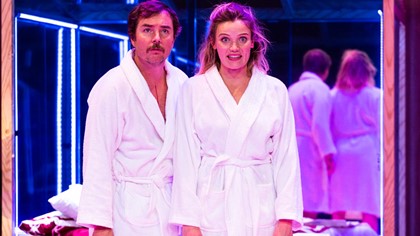For what shall it profit a man, if he shall gain the whole world, and lose his own soul? (Mark 8:36)
It’s the early 1980s in Australia. On the TV, ads flicker gravelly masculinity, flogging beer, lemon squash, and a new nationalism for the bigger world we are about to enter.
We’re gonna have to wake up sometime
that everything’s not OK
warns a Mojo-style eructation on the commercial airwaves. In Fremantle a ‘national hero’ wins a rich man’s yacht race and the country loses its bearings. Everywhere there seemed to be these men; entrepreneurs, raconteurs, filling up space, Good Blokes. One of them was PM. One of them had a resort in Queensland, his ad would croon Too Good to Be True. And of course it was. These Good Blokes were shysters.
Bliss feels like it’s from a vanished Australia in some ways. Carey wryly portrays an Aussie masculine yarnspinning tradition that wakes up and realises somewhere along the way it became sloganeering for economic nationalism. Henry Lawson and Joseph Furphy have become ponytailed copywriters, fashioning stories that— in the end—celebrate waste, vapidity, and worse. There’s a danger with this book.
A privileged man, who has sailed through life as an indulged mediocrity, realises he’s in a Hell, but he can’t see it’s a Hell of his own making. He attempts to find redemption and like Voltaire’s Candide he finds it tending his own garden. It’s a sprawling, two-steps-forward-one-step-back shaggy-dog story, with a strong pulse of romanticism. But when it all boils down, it’s still a story of that Good Bloke. And Good Blokes don’t represent humanity.
Dig a little deeper though and there’s other voices, whispering under the big story. Bettina, born in the smell of fossil fuels, who buys the American dream only to find out it’s a crock, and that it leads to folly. Barbara, who lives off the grid, but has to walk into the Underworld to stare down demons. And a panoply of slightly-crazed voices that are both familiar and strange.
Perhaps the questions they ask along the way are the point. Of Hell, of cancer, of stories, of cities, of what it is to die. A country, in the early days of rubbing its sleep from its eyes.
ADAPTED FOR THE STAGE BY / Tom Wright (Bliss)
